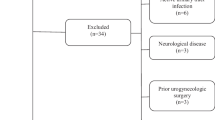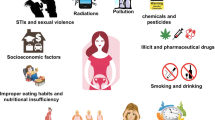Abstract
Introduction
Intrauterine devices are implantable contraceptives of which some brands steadily release levonorgestrel over an extended time period. Exposure to a levonorgestrel-releasing intrauterine device has been associated with depression and, more recently, a connection to anxiety, panic attacks, sleep problems and restlessness has been suggested. This study uses data from the THIN database of UK general practice to investigate these suggestions.
Methods
A cohort study was performed to compare the incidence of psychiatric adverse events between groups of women who were new users of levonorgestrel-releasing and non-hormonal intrauterine devices. Hazard ratios for the first occurrence of psychiatric symptoms or prescriptions of disease-specific treatments were calculated on an intention-to-treat basis using a proportional hazards model.
Results
Significant associations were found between levonorgestrel exposure and records of anxiety (hazard ratio = 1.18; 95% confidence interval 1.08–1.29) and sleep problems (hazard ratio = 1.22; 95% confidence interval 1.08–1.38) in women without a prior record of these events. No significant associations were found for panic attacks or restlessness. Clear baseline differences in clinical characteristics and age between the groups were present. These were included in the model as potential confounding factors.
Conclusion
Statistically significant associations of levonorgestrel exposure with anxiety and sleep problems were observed. Substantive differences in baseline characteristics of the treated groups make robust conclusions difficult but the results strongly suggest that additional studies are warranted.

Similar content being viewed by others
Notes
Note that the HR for LNG exposure illustrated in the figure is as estimated for all women but that absolute levels of anxiety as shown apply only to the specified values of the covariates.
References
Andersson K, Odlind V, Rybo G. Levonorgestrel-releasing and copper-releasing (Nova-T) IUDs during five years of use: a randomized clinical trial. Contraception. 1994;49:56–72.
Ayman A, Ewies A. Levonorgestrel-releasing intrauterine system: the discontinuing story. Gynecol Endocrinol. 2009;25(10):668–73.
Daud S, Ewies A. Levonorgestrel-releasing intrauterine system: why do some women dislike it? Gynecol Endocrinol. 2008;24(12):686–90.
Halmesmäki K, Hurskainen R, Teperi J, et al. The effect of hysterectomy or levonorgestrel-releasing intrauterine system on sexual functioning in women with menorrhagia: a 5 year randomized controlled trial. BJOG. 2007;114:563–8.
Patient Info. Anxiety and Mirena® (IUD). https://patient.info/forums/discuss/anxiety-and-mirena-iud–587345. Accessed 4 Apr 2018.
FBDC. Mirena® ruined my life: a public service announcement. https://fueledbydietcoke.com/2012/12/10/mirena-iud-ruined-my-life-a-public-service-announcement/. Accessed 4 Apr 2018.
AkdÄ. Psychiatrische Erkrankungen als unerwünschte Arzneimittelwirkung von Mirena® (Aus der UAW-Datenbank). https://www.akdae.de/Arzneimittelsicherheit/Bekanntgaben/Archiv/2009/20090501.html. Accessed 4 Apr 2018.
Bourke A, Dattani H, Robinson M. Feasibility study and methodology to create a quality-evaluated database of primary care data. Inform Prim Care. 2004;12:171–7.
Maguire A, Blak B, Thompson M. The importance of defining periods of complete mortality reporting for research using automated data from primary care. Pharmacoepidemiol Drug Saf. 2009;18:76–83.
Soriano LC, Wallander MA, Andersson SW, Requena G, García-Rodríguez LA. Study of long-acting reversible contraceptive use in a UK primary care database: validation of methodology. Eur J Contracept Reprod Health Care. 2013;19(1):22–8.
Booth N. What are the Read Codes? Health Libr Rev. 1994;11(3):177–82.
Cox DR, Oakes D. Analysis of survival data. London: Chapman and Hall; 1984.
Nutt D, Wilson S, Paterson L. Sleep disorders as core symptoms of depression. Dialogues Clin Neurosci. 2008;10(3):329–36.
Worly B, Gur T, Schaffir J. The relationship between progestin hormonal contraception and depression: a systematic review. Contraception. 2018. https://doi.org/10.1016/j.contraception.2018.01.010 (Epub ahead of print).
Skovlund CW, Mørch LS, Kessing LV, Lidegaard Ø. Association of hormonal contraception with depression. JAMA Psychiatry. 2016;73:1154–62.
Office of National Statistics. Sexual and reproductive health services, England 2015–16. London: Office of National Statistics; 2016.
Author information
Authors and Affiliations
Corresponding author
Ethics declarations
Funding
This study was conducted using European Medicines Agency resources and no additional funding source.
Conflict of interest
Jim Slattery, Daniel Morales, Luis Pinheiro and Xavier Kurz have no direct or indirect financial or personal interest in the products included in this study or in competitor products.
Data availability
This study uses de-identified data from UK general practice collected in the THIN database.
Ethics approval
The study protocol was approved by the THIN Scientific Review Committee.
Disclaimer
The views expressed in this article are those of the authors and should not be understood or quoted as being made on behalf of or reflecting the position of the European Medicines Agency.
Electronic supplementary material
Below is the link to the electronic supplementary material.
Rights and permissions
About this article
Cite this article
Slattery, J., Morales, D., Pinheiro, L. et al. Cohort Study of Psychiatric Adverse Events Following Exposure to Levonorgestrel-Containing Intrauterine Devices in UK General Practice. Drug Saf 41, 951–958 (2018). https://doi.org/10.1007/s40264-018-0683-x
Published:
Issue Date:
DOI: https://doi.org/10.1007/s40264-018-0683-x




